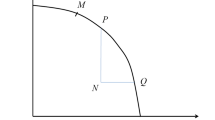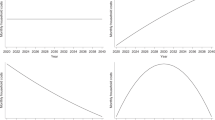Abstract
The artifice of an infinitely-lived representative agent iscommonly invoked to balance the present costs and future benefitsof climate stabilization policies. Since actual economies arepopulated by overlapping generations of finite-lived persons,this approach begs important questions of welfare aggregation.This paper compares the results of representative agent andoverlapping generations models that are numerically calibratedbased on standard assumptions regarding climate--economyinteractions. Under two social choice rules -- Pareto efficiencyand classical utilitarianism -- the models generate closelysimilar simulation results. In the absence of policies toredistribute income between present and future generations,efficient rates of carbon dioxide emissions abatement rise from15 to 20% between the years 2000 and 2105. Under classicalutilitarianism, in contrast, optimal control rates rise from 48 to 79% this same period.
Similar content being viewed by others
References
Auerbach, A. J. and L. J. Kotlikoff (1987), Dynamic Fiscal Policy. New York: Cambridge University Press.
Blanchard, O. J. and S. Fischer (1989), Lectures on Macroeconomics. Cambridge, MA: MIT Press.
Broome, J. (1992), Counting the Cost of Global Warming. Cambridge: White Horse Press.
Burton, P. S. (1993), ‘Intertemporal Preferences and Intergenerational Equity Considerations in Optimal Resource Harvesting’, Journal of Environmental Economics and Management 24, 119-132.
Chapman, D., V. Suri and S. G. Hall (1995), ‘Rolling DICE for the Future of the Planet’, Contemporary Economic Policy 13, 1-9.
Cline, W. R. (1992), The Economics of Global Warming. Washington: Institute for International Economics.
Coase, R. H. (1960), ‘The Problem of Social Cost’, Journal of Law and Economics 3, 1-44.
Geanakoplos, J. (1987), ‘Overlapping Generations Model of General Equilibrium’, in J. Eatwell, M. Milgate and P. Newman, eds., The New Palgrave: General Equilibrium. New York: Norton.
Golombek, R., C. Hagem and M. Hoel (1995), ‘Efficient Incomplete International Climate Agreements’, Resource and Energy Economics 17, 25-46.
Howarth, R. B. (1996), ‘Climate Change and Overlapping Generations’, Contemporary Economic Policy 14, 100-111.
Howarth, R. B. (1998), ‘An Overlapping Generations Model of Climate-Economy Interactions’, Scandinavian Journal of Economics 100, 575-591.
Howarth, R. B. and P. A. Monahan (1996), ‘Economics, Ethics, and Climate Policy: Framing the Debate’, Global Planetary Change 11, 187-199.
Howarth, R. B. and R. B. Norgaard (1995), ‘Intergenerational Choices under Global Environmental Change’, in D. W. Bromley, ed., Handbook of Environmental Economics. Oxford: Blackwell.
Kirman, A. P. (1992), ‘Whom or What Does the Representative Individual Represent’, Journal of Economic Perspectives 6, 117-136.
Manne, A. S. (1995), ‘The Rate of Time Preference: Implications for the Greenhouse Debate’, Energy Policy 23, 391-394.
Manne, A. S. (1996), ‘Intergenerational Altruism, Discounting and the Greenhouse Debate’, Department of Engineering Economic Systems and Operations Research, Stanford University.
Marini, G. and P. Scaramozzino (1995), ‘Overlapping Generations and Environmental Control’, Journal of Environmental Economics and Management 29, 64-77.
Mourmouras, A. (1993), ‘Conservationist Government Policies and Intergenerational Equity in an Overlapping Generations Model with Renewable Resources’, Journal of Public Economics 51, 249-268.
Nordhaus, W. D. (1994), Managing the Global Commons. Cambridge, MA: MIT Press.
Ramsey, F. (1928), ‘A Mathematical Theory of Saving’, Economic Journal 38, 543-559.
Rose, A. and B. Stevens (1993), ‘The Efficiency and Equity of Marketable Permits for CO2Emissions’, Resource and Energy Economics 15, 117-146.
Schmidt, A. A. (1995), ‘The Environment and Property Rights Issues’, in D. W. Bromley, ed., Handbook of Environmental Economics. Oxford: Blackwell.
Stephan, G., G. Müller-Fürstenberger and P. Previdoli (1997), ‘Overlapping Generations or Infinitely-Lived Agents: Intergenerational Altruism and the Economics of Global Warming’, Environmental and Resource Economics 10, 27-40.
Author information
Authors and Affiliations
Rights and permissions
About this article
Cite this article
Howarth, R.B. Climate Change and the Representative Agent. Environmental and Resource Economics 15, 135–148 (2000). https://doi.org/10.1023/A:1008361812597
Issue Date:
DOI: https://doi.org/10.1023/A:1008361812597




